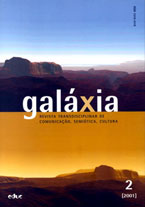<b>O anseio da língua-mãe nas entrelinhas da tradução automática</b>
Resumo
No presente artigo, examinaremos a possível interligação entre o mito da Línguamãe - tomando-se como referência o mito bíblico da Torre de Babel - e os programas de tradução automática. Ao longo de sua história, a humanidade (inconscientemente) almeja alcançar uma língua universal, pré-babélica, registrando este anseio por meio de poemas, canções, mitos, relatos folclóricos, bem como de projetos de línguas universais como o Esperanto. Acreditamos que subjacente às propostas de softwares de tradução automática, como Systran e Globalink Power Translator Pro, que prometem “remover” as barreiras lingüísticas impostas pela multiplicidade de idiomas através de um único comando, há o desejo de uma tal língua primeira e ancestral, cuja mera possibilidade de existência nega a necessidade da tradução. Palavras-chave língua universal, mito, tradução automática. Abstract In this paper we intend to examine the possible interwining of the myth of the Proto-language - particularly as expressed in the biblical myth of the Tower of Babel - with projects of computarized translation. Throughout history, humankind has (unconsciously) wished to achieve a universal, pre-Babelian language and has recorded this dream by means of poems, songs, mythical tales, folklore, as well as projects of universal languages like Esperanto. It is our contention that underlying the proposal of translation software packages like Systran or Globalink Power Translator Pro, which promise to “remove” the linguistic barriers imposed by the multiplicity of languages by means of a single command, there is a longing for such a primeval, ancestral language, the very possibility of existence of which negates the need for translation. Key words universal language, myth, computarized translation.Downloads
Publicado
2007-02-16
Como Citar
Darin, L. C. D. M. (2007). <b>O anseio da língua-mãe nas entrelinhas da tradução automática</b>. GALÁxIA. Revista Interdisciplinar De Comunicação E Cultura, (2). Recuperado de https://revistas.pucsp.br/index.php/galaxia/article/view/1236
Edição
Seção
Artigos | Articles
Licença
Os autores de artigos publicados mantêm os direitos autorais de seus trabalhos, licenciando-os sob a licença Creative Commons CC-BY, que permite que os artigos sejam reutilizados e distribuídos sem restrição, desde que o trabalho original seja corretamente citado. Os autores concedem para GALÁxIA. Revista Interdisciplinar de Comunicação e Cultura o direito de primeira publicação.



 Este obra está licenciada com uma Licença
Este obra está licenciada com uma Licença 